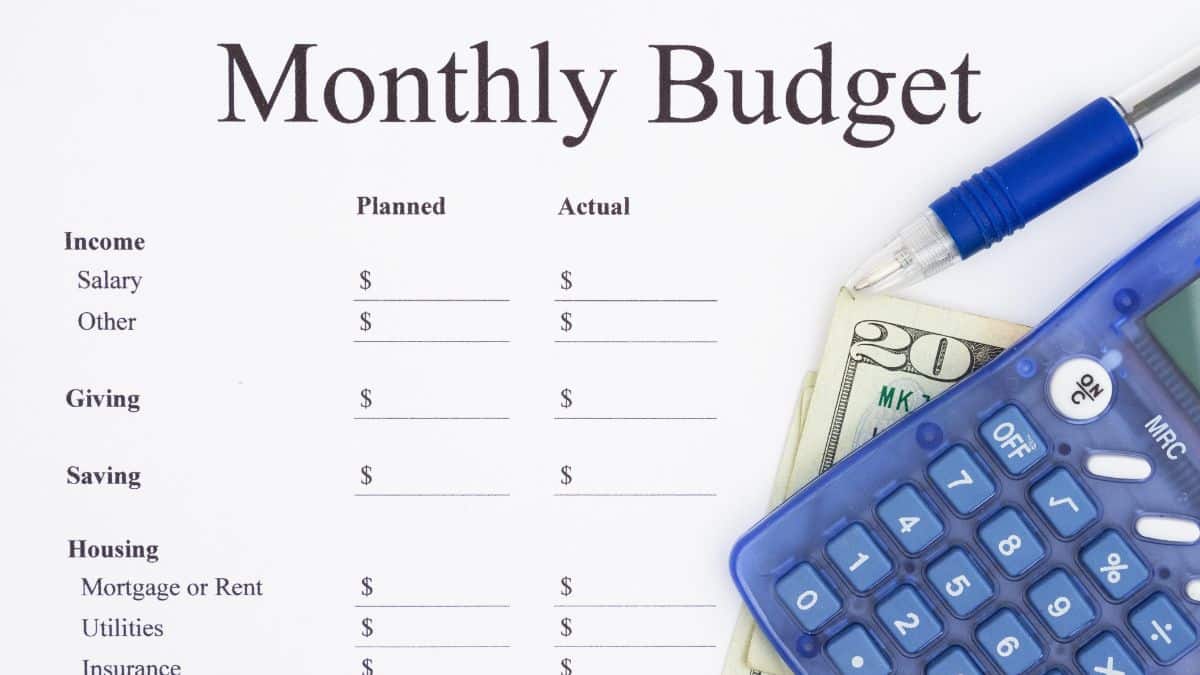Cutting expenses to the bone is scary and overwhelming to most people. But when you’re deeply in debt and feeling lost, you begin to search for any opportunity to shorten your everyday expenses list.
Living With Debt

Living with debt can feel exhausting at times. It can feel as though you are drowning and constantly sacrificing things you want to do and buy just to make debt payments.
💸 Take Back Control of Your Finances in 2025 💸
Get Instant Access to our free mini course
5 DAYS TO A BETTER BUDGET
Living on a Budget

Living on a budget can change the game for you. Budgeting is the one single action that can help you gain some major traction on your journey to becoming debt-free.
Cut Spending

In addition to consistent monthly budgeting, another way to fast-track your debt payoff is to slash your spending. Cutting out most non-essential spending and sticking to your budgeted amounts for each category as strictly as possible will help free up some extra money each month.
Eliminating these specific seven expenses can give you a solid boost in the amount of money you’re able to put towards your debt snowball payment each month.
Cutting Expenses to the Bone

When you are first creating your zero-based budget, you may realize the numbers are upside down. This means you don’t have enough money left at the end of the month to save, pay off debt, or even cover your basic living expenses.
A Frugal Lifestyle

Exploring a more frugal lifestyle, finding creative ways to save money in your day-to-day, and committing to making a few substantial cuts to specific expenses that feel essential (but really aren’t) can make the world of difference and probably still keep you living quite comfortably and making some major progress on paying off your debts.
7 Expenses To Cut To Get Out of Debt Fast

While there are countless ways to save money in your budget each month, these specific expenses have the opportunity to make a big impact on your bottom line.
1. Cutting Cable

Take a minute to pull out your current cable bill and have a look. Is it over $100 per month? $200? It’s also likely that it’s bundled with additional services you may or may not need driving your bill higher.
Sure, we all know about Netflix, but the recent surge of people ditching their insanely high cable bills has caused some other big players to pop up. Dozens of paid and free streaming services are available.
2. Landline Phone

Probably the only reason you still have a landline phone is that your cable company threatens to raise your rate to an even more ridiculous amount if you break the bundle. If you actually use your home phone, then keep it if you’d like, but if you don’t use it, don’t pay for it.
Plus, canceling your landline will also free up more money in your budget if you need to upgrade your cell plan in the process.
3. Getting Takeout or Eating Out at Restaurants

Frequent trips to your favorite restaurant or daily DoorDash orders will drain your budget real quick. Dining almost exclusively at home while paying off debt will help you save a ton of money you otherwise would have thrown away at restaurants.
If you dine out often only out of convenience, try dedicating a day to food prepping. Prepare a variety of proteins and vegetables ahead of time that you can throw together for various easy meals throughout the week.
4. Paying for Things You Can Do Yourself

There is absolutely nothing wrong with hiring a cleaning service or getting yourself a monthly manicure. However, if debt freedom is your goal, making temporary sacrifices will help you reach that goal more quickly.
Learning how to do your own nails, dedicating a few hours each week for everyone in the family to pitch in and clean the house, or changing the oil in your car can save you thousands of dollars over the course of the year.
5. Going Out With Friends

It’s important to maintain some degree of social life while working to pay off debt, but the markup of alcohol at bars and restaurants is out of this world.
Why not host your pals at your place instead? Grab a few bottles of your favorite spirits and a cocktail recipe book, and you’ll be whipping up fancy cocktails for a fraction of the cost. If house parties just aren’t your jam, there is nothing wrong with a low-key night out every once in a while if you budget for it in advance.
6. Whole Life Insurance

Insurance is a personal decision, but it’s important to be insured in one way or another, especially if you have people who depend on you to take care of them.
Contact an insurance broker (a broker works with multiple companies instead of just one) to be sure you are receiving competitive rate quotes and decide which type of insurance is best for you. If you currently have a whole-life policy you can typically get a term policy for much cheaper.
7. Food Budget

Aside from your housing costs, food is usually your highest monthly expense, which is why it is so easy to decrease. Start by tracking your food expenses.
If you’re surprised by the total at the end of your tracking period (track for a full month, if possible), then you have some room for improvement. Opt for meal planning and cooking at home instead. You’ll save a substantial amount of money and probably have a bunch of leftovers too.
What Are Sinking Funds? Everything You Need to Know…

This is your ultimate guide to sinking funds so we are going to cover everything you need to know: what they are, how to use them, why you should use them, where you should keep them, and even specific examples of sinking funds you should probably be using! What Are Sinking Funds? Everything You Need to Know…
The Best Gas Apps To Save Money at the Pump

With gas prices hitting record levels this year, it’s no surprise that consumers are looking for ways to cut costs. That’s where gas apps come in. These apps help you find the cheapest gas and offer rewards too. The Best Gas Apps To Save Money at the Pump


